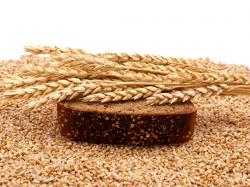Locally Grown N.C. Organic Wheat Means Locally Grown N.C. Baked Goods
January 26, 2011 | 2 min to read

For those who attended CFSA’s 25th Annual Sustainable Agriculture Conference, you likely tasted at least one of the various baked goods made with NC grown wheat. The cookies provided for the mid-day break were from West End Bakery, made with Arapaho wheat grown by Fred Miller on Hilltop Farm in Wake Co, smack dab in the middle of the state. The bread presented at Saturday evening’s reception was from Farm and Sparrow Breads, made with Turkey wheat grown by John McEntire on Peaceful Valley Farm in Old Fort, at the foothills of our mountainous western region. And the rolls served with Saturday evening’s dinner were from Annie’s Naturally Bakery, made with Lindley Mills flour, from TAM303 hard red wheat, grown by Ben and Kenny Haines of Looking Back Farms located in Tyner, on the far northeastern end of the state.
For each, there was a story, each illustrating a different route to the same end: the revival of regional grain production and commerce. Three different varieties of wheat, each from a different time in agriculture’s history: a heritage wheat, Turkey; a modern wheat, Arapaho; and a regionally adapted wheat, TAM303.
Turkey wheat is a landrace grain, meaning that it predates modern breeding. Turkey arrived in this country in the early 1870s, brought to Kansas by Mennonite immigrants from the Ukraine, fleeing Tsarist persecution. Turkey wheat is, ironically, partly to blame for the death of the community stone mill. It thrived in Kansas, swiftly becoming the primary wheat variety planted throughout the Central Plains. It did so well, that it pushed forward the advancement of milling technology. But that’s a whole other story. What’s important for this telling is that Turkey was replaced in the mid- 1940s, by modern higher-yielding cultivars. Though a small group of farmers in Kansas have started a wheat revival project to bring back this wheat. And Slow Food has inducted Turkey into its U.S. Ark of Taste. Its mission: By promoting and eating Ark products we help ensure they remain in production and on our plates.
To read the rest of the story, please go to: Mountain Express
